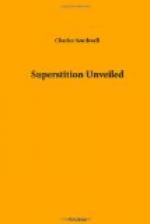The same Hume who thus pleasantly rebuked ‘most religious philosophers,’ was himself a true Universalist. That he lacked faith in the supernatural must be apparent to every student of his writings, which abound with reflections far from flattering to the self-love of superstitionists, and little calculated to advance their cause. Hume astonished religious fanatics by declaring that while we argue from the course of nature and infer a particular intelligent cause, which first bestowed, and still preserves order in the universe, we embrace a principle which is both uncertain and useless. It is uncertain, because the subject lies entirely beyond the reach of human experience. It is useless, because our knowledge of this cause being derived entirely from the course of nature, we can never, according to the rules of just reasoning, return back from the cause with any new inference, or making additions to the common and experienced course of nature, establish any principles of conduct and behaviour. [9:1]
Nor did Hume affect to consider popular Christianity less repugnant to reason than any other theory or system of supernaturalism. Though confessedly fast in friendship, generous in disposition, and blameless in all the relations of life, few sincere Divines can forgive his hostility to their faith. And, without doubt, it was hostility eminently calculated to exhaust their stock of patience, because eminently calculated to damage their superstition, which has nothing to fear from the assaults of ignorant and immoral opponents; but when assailed by men of unblemished reputation, who know well how to wield the weapons of wit, sarcasm, and solid argumentation, its priests are not without reason alarmed lest their house should be set out of order.
It would be difficult to name a philosopher at once so subtle, so profound, so bold, and so good as Hume. Notwithstanding his heterodox reputation, many learned and excellent Christians openly enjoyed his friendship. A contemporary critic recently presented the public with ’a curious instance of contrast and of parallel,’ between Robertson and Hume. ’Flourishing (says he) in the same walk of literature, living in the same society at the same time; similar in their habits and generous dispositions; equally pure in their morals, and blameless in all the relations of private life: the one was a devout believer, the other a most absolute Atheist, and both from deep conviction, founded upon inquiries, carefully and anxiously conducted. The close and warm friendship which subsisted between these two men, may, after what we have said, be a matter of surprise to some; but Robertson’s Christianity was enlarged and tolerant, and David Hume’s principles were liberal and philosophical in a remarkable degree.’ [9:2]
This testimony needs no comment. It clearly tells its own tale, and ought to have the effect of throwing discredit upon the vulgar notion that disgust of superstition is incompatible with talents and virtues of the highest order; for, in the person of David Hume, the world saw absolute Universalism co-existent with genius, learning, and moral excellence, rarely, if ever, surpassed.




